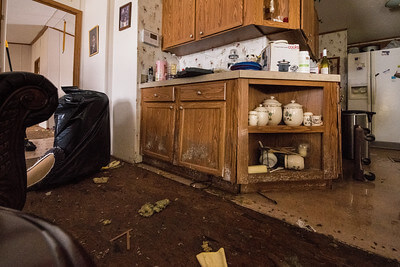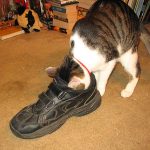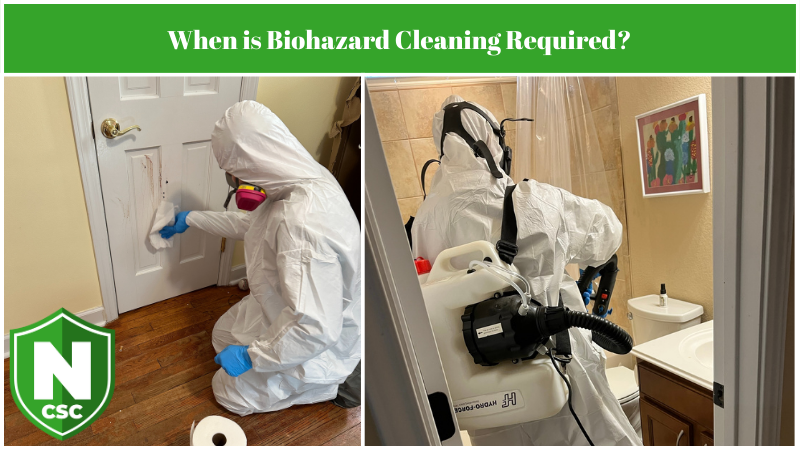House Odors That Require Immediate Attention

Foul aromas in the home can cause problematic allergenic-type symptoms of varying severities, from wheezing to throat irritation or worse. It also makes hosting or relaxing in your home embarrassing and even unsafe. Beyond the potential health hazard, identifying and solving a foul home odor is important. Trying to avoid this step by reselling a stinky home is no easy feat and you won’t get the full value for the property.
So, how do you know when the house odor is unsafe? You’ll know it’s time to call a biohazard specialist or evacuate if any of these pervasive odors exist:
- A dead body smell
- Pet excrement (e.g. cat urine, dog feces)
- Musty or moldy smells
- Sewage smell
- Rotten egg smell
- Gas smell
- Rotting food
These odors are a serious concern when they pervade or intensify over an extended period of time. The best way to handle these situations is by having a professional biohazard crew such as NCSC evaluate and treat the situation.
Who do I call for foul smells in my home?
Great question, since there are so many types of problems and situations that require different specialists, you may be wondering who can you call for your problem. Well, the first thing you have to do is determine the source of the issue. Is it a leak in the roof causing musty mold smells in your attic, or is the problem the result of an improper and overlooked decomposition cleanup?
Again, it circles back to the type of odor and problem in the home.
Identifying a Decomposition Odor
Decomposition matter elicits a strong, revolting odor that varies in intensity depending on the situation. Any of these may indicate a death smell:
- Rotten eggs
- Rotting flesh
- Strong, earthy, fecal odor
- Rotting garlic (with the presence of blowflies)
- Rotting cabbage
- Fishy smells
- Ammonia smells
To read more, check out the article on nine decomposition gasses.
If you suspect the smell is any of these odors, call us right away. The seriousness of these situations should not be underestimated. Any of these odors directly indicates the presence of harmful microbial matter such as bacteria, parasites, and animal feces. Although danger may not be immediately present, these situations can spread, resulting in unknowing direct contact with potentially lifelong diseases and illnesses. There is a reason why some decomposition odors have been known to elicit an instinctual “fight or flight” response
Pervasive Pet Odors
As 67% of Americans claim to own at least one pet, the odds are you’ve cleaned up after an animal in your home at least once. Sometimes, although you’ve done your due diligence and even bathed your pet a dozen times, pet odors continue to remain. These can be ammonical, fecal, or just plain musty animal odors. When this is the case, the culprit is likely old pet excrement. And your carpet is often the contributing problem.

Cat urine stains and damages carpets and flooring when not treated properly.
Cleaning up after a pet that had an accident on the carpet is a difficult task due to how the organic matter seeps and stains into the carpet fibers. Even if you have cleaned the area to the best of your ability, feces can get trapped or stained on the fibers within the carpet. Carpet also prevents you from accessing the flooring underneath, so waste can seep down and damage your floors.
Furthermore, when the type of flooring underneath the carpet is wood, seeped urine can dry or even infiltrate the wood’s pores, resulting in permanent floor damage. And this is a cycle that can worsen if there is an abundance of enzymes trapped underneath the carpet. These enzymes are likely to attract fleas, mites, or maggots, and the moisture can cause mold growth.
That’s especially the reason why you will want to contact professionals immediately to test and evaluate if you have persistent pet odors in your home. A professional biohazard company is trained and licensed to restore these situations by properly removing the carpet and replacing the damaged flooring.
Fishy and Rotting Food Smells
The tricky thing about evaluating fishy, ammoniacal, or rotting food smells is that there are some similar-smelling decomposition odors. In general, you’ll know if the smells are decomposition in origin if there is a presence of flies, maggots, or otherwise. You’ll also be able to determine it by the intensity of the smell, as well as any other odors.
If the odor is just a fishy smell, check if the odor is coming from the freezer or refrigerator unit. It may be expired food, a malfunctioning refrigerator, or a unit in need of disinfecting.
Check if the odor intensifies in the attic, bathroom, or basement. These are usually areas of high moisture content and thus favorable conditions for mold growth. A fishy scent can be the culprit of mold–especially when there are musty odors or a leak. Trust your nose–if it smells like a weird type of mold, it probably is.
Rotting food scents (e.g. rotten eggs, sulfur) can be the culprit of a gas leak or a sewage problem. You’ll know if this is the case when there are strong human feces, urine, and sewage odors. Sewage odors or gases require the attentiveness of a plumber right away. When left unresolved, they can cause flooding and damage to the structure, and create the perfect opportunity for mold growth.
When it’s a ventilation or mold issue, you’ll want to call a hazmat company like NCSC for abatement.




